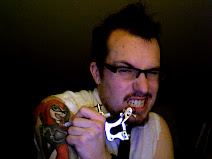Gender in the 21st century is a pretty contentious thing, which is one of the few things that most people can agree on when the topic comes up. Of course it gets even more contentious where transgender issues are concerned. If I say that gender is largely a social construction, then in some quarters it must mean that being transgendered is somehow irrelevant or counterproductive. Why would I say that I want to look and act like a woman? Isn't that supporting the idea of women and men having specific codified roles in society?
Depends on your perspective. On the one hand, referring to a certain set of qualities or characteristics as being specifically masculine or feminine does appear to support the concept of a binary gender system. However, the implementation of those characteristics and qualities by the sex opposite to that usually associated with them suggests that while they may be a specific set of tropes, they are far more modular than generally assumed. That is to say that while the traits we generally refer to as being feminine or masculine based on social expectations of heteronormativity do typically manifest themselves more or less as cohesive wholes, they do not require the corresponding sex organs. Hence the butch/femme diagnostic employed by the LGBT community.
This point- while having always been hovering somewhere in my subconscious- never made it into my conscious thought patterns until I was reading a relationship advice column in the local LGBT free newspaper Xtra West. The article was written by someone you'd generally refer to as being a "butch lesbian;" a woman attracted to other women who espouses and exalts traditionally masculine traits over feminine ones. What was interesting about the article is that it was advice for those of the butch persuasion on how to get over a bad break up. Because of the lack of male/female or sexual orientation connotations, the article was easily accessible and equally relatable to men and women both gay and straight given that they have more of an interest in building things and being stoic than buying a new pair of shoes and eating a lot of ice cream.
That modularity is what makes the butch/femme diagnostic the most useful and accurate description of contemporary gender. While it would probably be preferable to use tags that are completely free of association with the sexes, the nomenclature must remain understandable and relatable to the general public if there is to be any widespread recognition or adoption of it. Butch women and femme men may face a bigger share of discrimination and ridicule for stepping outside of the expected gender norm, but accurately describing how they express themselves is the only way forward. You cannot collapse a false dichotomy without first proving that it is false.
Just as important as removing gender from the context of sex is removing it from sexual orientation. No matter how much we'd like to pretend otherwise, we do still live in a world where if you are homosexual, you are assumed to emulate the qualities of the opposite sex and visa versa. I can't say I'm aware of what the prevailing FTM stereotypes are in terms of orientation but it's rather safe to say that if you are transwoman, you are assumed to be homosexual or perhaps more accurately; androphilic. As if it is unthinkable that you could be born a man, feel more comfortable as a woman, and be sexually attracted to women all at the same time. There are, of course, a great many androphilic transwomen but gynophilic transwomen exist as well which is of course how I identify myself in that context. It's an excellent illustration of just how intrinsically linked sex, gender, and orientation are in everyday life, which is truly unfortunate given the truth of the situation.
One of the more laudable things that substituting traditional gender labels with the butch/femme diagnostic is that it breaks down barriers between the different elements of the queer community as well as those between the queer and straight communities. It provides common ground for traditionally segregated or oppositional groups. The clearest usage of the butch/femme diagnostic to break down barriers between fundamentally different groups is the propensity for straight women and (femme) gay men to socialize, something that by comparison rarely happens between straight men and (butch) lesbians.
The key here is that we are still a long ways away from being able to retire an essentially binary diagnostic tool for gender, but there is still a great deal of progress that can be made by detaching the language we use for defining gender from sex and orientation to become something completely modular. Real change occurs incrementally, after all.
In Transition/Under Construction Part 2
Posted by
GonzoChaote
Thursday, March 18, 2010

0 comments:
Post a Comment